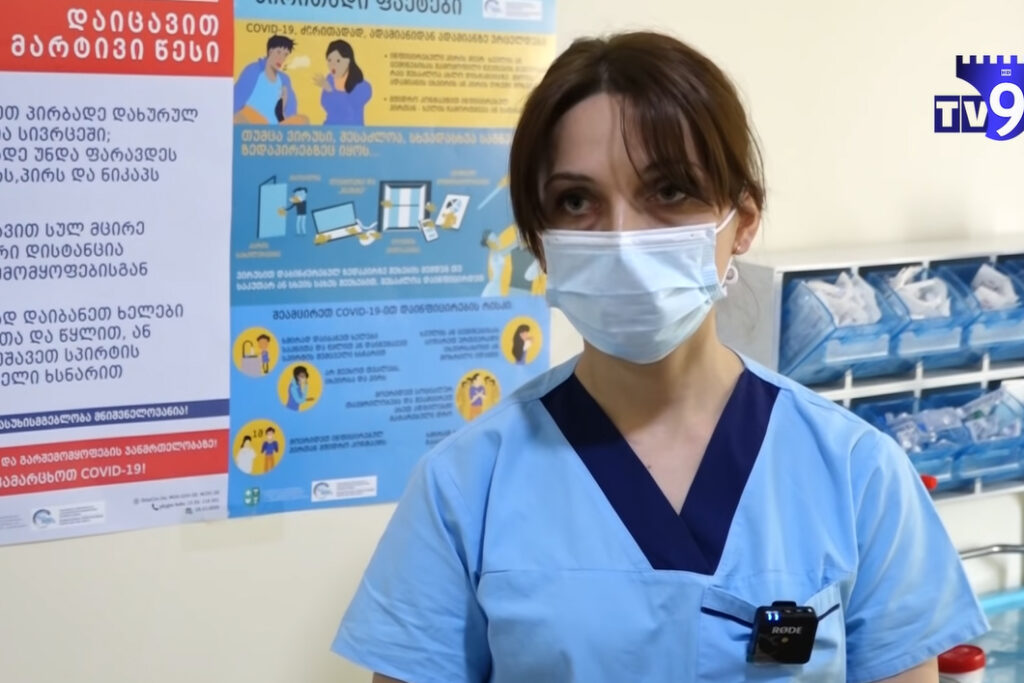Georgian medical authorities are on damage control following what appears to be a fatal allergic reaction to the AstraZeneca coronavirus vaccine, a dramatic incident at the outset of long-awaited mass inoculations in the country.
Officials and doctors have scrambled to soothe public concerns after Megi Bakradze, who received her first shot of the vaccine in the southwestern town of Akhaltsikhe on 18 March, died the following day. The 27-year-old nurse fell into a coma less than 30 minutes after getting the jab.
The incident came just three days after Georgia began rolling out the Oxford/AstraZeneca vaccine, which the country obtained through the global COVAX programme. Medical workers had been identified as the first target group to get shots.
On 15 March, the World Health Organisation noted that ‘around one person in every one million people vaccinated (…) may have a severe allergic reaction to the COVID-19 vaccines, known as anaphylaxis’. They advised vaccination providers to have relevant medical staff prepared for such cases.
Following news of Bakradze’s death, Georgian Health Minister Ekaterine Tikaradze vowed to be publicly vaccinated in an effort to show that the vaccine was safe.
According to the health ministry, an initial probe suggested that medical staff in Akhaltsikhe acted according to protocol for an acute anaphylactic reaction, including timely provision of epinephrine and transportation of the patient to Tbilisi.
Both medical and law enforcement authorities are currently probing the incident.
Hours after Bakradze’s death on Friday, the Director of Georgia’s National Centre for Disease Control (NCDC), Amiran Gamkrelidze, expressed unease at a drop in the number of daily vaccinations.
According to the NCDC, only 3,674 medical staff had been vaccinated by 20 March noon after the process was launched on 15 March. Georgia had planned to vaccinate 1,600,000 people this year.
Talking to TV channel Rustavi 2 on 19 March, the health minister said she believed the deceased nurse, Megi Bakradze, would be seen as a ‘hero and a symbol of vaccination and a fight against pandemic’.
Georgian health authorities underlined that Bakradze herself advocated for vaccinations publicly.
The authorities have cited a ruling on 18 March by the European Medicines Agency that the AstraZeneca vaccine was safe. The agency was responding to anxieties over reports the vaccine may have contributed to an increased risk of blood clots.
A week earlier, the regulator recommended adding information about the risk of anaphylaxis to the vaccine’s packaging, based on 41 reported cases of possible non-fatal anaphylaxis among 5 million vaccinations in the UK.

‘Georgians often trust priest more than doctors’
Paata Imnadze, the Deputy Director of NCDC, along with Marina Ezugbaia and Marina Endzeladze from Tbilisi’s Infectious Diseases Hospital were among the first to get vaccinated in Georgia in front of the media on 15 March.
The three have been among the most visible faces updating the public on how the country was handling the pandemic since late February last year.
The televised vaccination came two days after Georgia received the first batch of 43,200 doses of the Oxford/AstraZeneca vaccine through the international vaccine-sharing mechanism, COVAX.
According to Georgia’s Health Ministry, the second doses needed for those currently getting vaccinated with the AstraZeneca vaccine will be available in two months.

After the death of Megi Bakradze, the NCDC did not rule out involving more public figures outside their primary target groups as role models to get jabs.
The Georgian Orthodox Church, the most trusted institution in the country, have already made clear — on three separate occasions since early February — that they would take no part in pro-vaccination campaigns.
The Patriarchate of the Church reiterated their position on 18 March, after health minister Ekaterine Tikaradze visited Church head Ilia II.

Earlier in the week, the leaders of the NCDC urged the Church to help them, with NCDC Director Amiran Gamkrelidze admitting that Georgians often trusted priests more than doctors.
Gamkrelidze was politely redirected by the Church spokesperson Andria Jaghmaidze to their Synod ruling issued on 12 February.
The February ruling of the Synod, the decision-making body of the Church, underlined everyone’s choice to get vaccinated and also cited ‘differences of opinions among medical authorities in various countries’ over a ‘vaccine that is newly created’. The statement also mentioned a need for ‘norms of bioethics’ to be observed in the production of vaccines to be imported to Georgia.
According to a survey by CRRC Georgia released in July last year, 43% said they would not want a vaccine if it was available in six months.
[Read the entire analysis by CRRC on OC Media: Georgia has a vaccine misinformation problem]




 20 March 2021
20 March 2021



